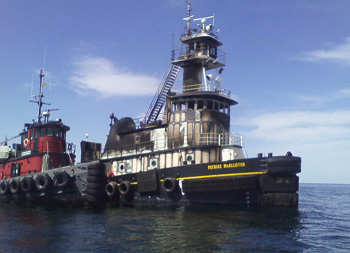Paying attention to basic maintenance is at the heart of the Towing Safety Advisory Committee (TSAC) recommendations on preventing fires in tugboats.
TSAC’s report, issued in September 2013, includes suggestions to keep engine compartments in structurally sound condition and to reduce the risk that hot oil spray might ignite on a hot surface.
“It’s all about things like keeping metal doors intact and uncompromised. In other words don’t let guys drill holes all through your bulkheads,” said Capt. Eric Johansson, who headed the subcommittee that drew up the report. “A lot of the precautions are basic stuff.”
Based on U.S. Coast Guard investigations, 72 percent of incidents occurred in the engine room, 10 percent in the galley, 8 percent on the fidley and 5 percent on the crew deck. Machinery failure accounted for 37 percent of incidents, lack of maintenance 31 percent and human error a high 28 percent. Suspicious causes were 5 percent.
Official figures say there are about 6,000 tug/towboats in the U.S., meaning that the percentage of accidents averaged at 0.006 a year, while serious fires were 0.0015 percent per year.
The report specifically mentioned two fires that occurred in the past couple years — the death of the chief engineer aboard Patrice McAllister in Lake Ontario and an incident involving Louisiana-based Marguerite L. Terral.
In the six years to the end of 2012 there were 235 incidents, with 11 injuries and the one fatality. Total damage was more than $26 million.
Rivers were the main area of operation where the incidents happened (46 percent), followed by other inland waterways including the Great Lakes, totaling 33 percent. Offshore was 10 percent, shipyards 8 percent and the Gulf Intracoastal Waterway 3 percent.
Seventy-seven percent of fires were contained. Judging by the information in the Coast Guard reports, those that were not contained were largely because there was no one on board.
One piece of information missing from the Coast Guard reports is the age of the vessels involved.
“We are trying to get the Coast Guard to improve and standardize their reports,” said subcommittee member Robert Clinton of Dunlap Towing in Seattle. “An example is the cops — they have standard report forms that give all the details. Lots of information is just not there in the Coast Guard reports.”
Clinton said proper maintenance is essential in preventing fires. “There were cases of reduction gears getting hot, dirty air intakes — that sort of thing.”
Johansson, a faculty member at SUNY Maritime College, said the costs of taking precautions and enforcing safety are easily manageable. “You’re supposed to take these measures already, such as adequate ventilation in the engine room,” he said.
One suggested measure in the TSAC report is to minimize the risk that oil might spray onto a hot surface.
“In cases of oil lines near ignition sources it is necessary to carefully consider the probability of spray, possible spray direction, and spray distance,” the TSAC report said. “Where sounding pipes are used, they should not terminate in any space where the risk of ignition of spillage from the sounding pipe might arise.”
Happily for the industry, the incidence of fires has not been getting worse. But even one death is too many, said Holly Riester, director of safety and environmental stewardship with American Waterways Operators (AWO).
“A single fatality on a towing vessel is tragic and is always too much. The critical number we are focused on is zero,” Riester said. “And the safety culture of AWO calls upon member companies to continuously improve and aim for zero harm — to people, to the environment, to property and to the vessels themselves.
“The Responsible Carrier Program, the safety management system that is mandatory for all AWO member companies, emphasizes training, drills and the diligent upkeep of equipment to prevent incidents such as an onboard fire. This strong system of training also prepares vessel operators to minimize fire risks and to help prevent small incidents from growing into serious ones,” she said.
Riester agrees with TSAC that the industry must develop and follow best practices. “The Responsible Carrier Program requires safety training, including a special focus on fire safety and drills,” she said.
AWO is keeping its eye on vessel maintenance. “Regardless of its age, to be RCP compliant a vessel must pass an inspection that confirms it is well maintained and meets the highest safety and environmental standards within the industry, exceeding regulatory requirements and setting the gold standard for a towing vessel,” Riester said.
TSAC advises the Coast Guard, so the report is a recommendation only, not a new regulation.

